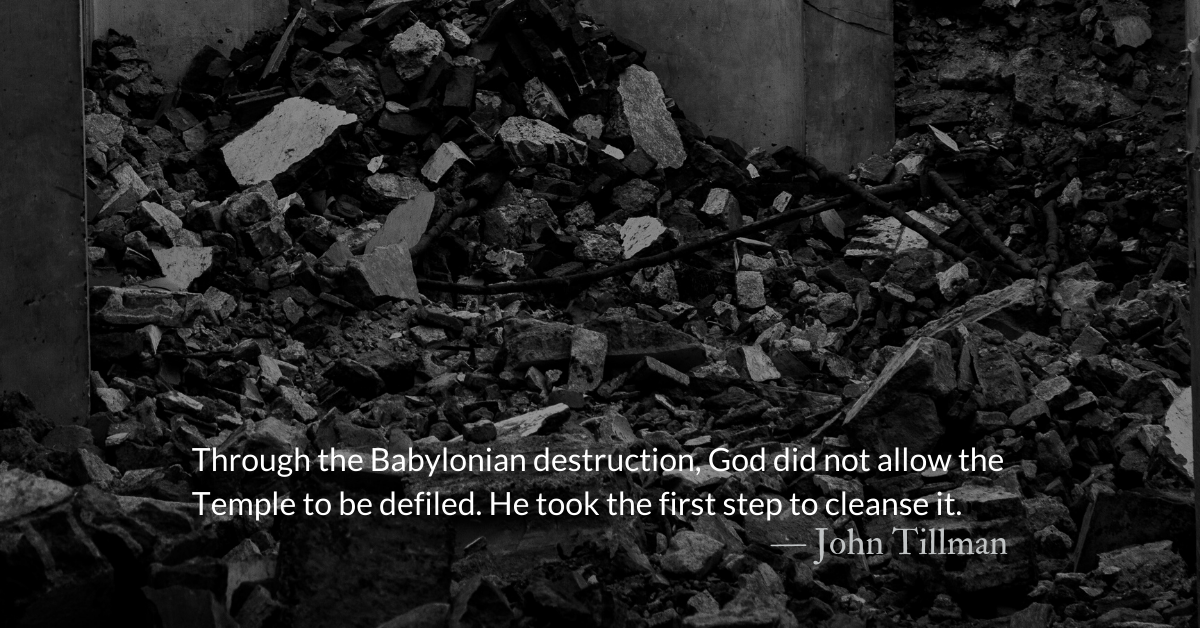Scripture Focus: Isaiah 64.6-7, 10-11
6 All of us have become like one who is unclean,
and all our righteous acts are like filthy rags;
we all shrivel up like a leaf,
and like the wind our sins sweep us away.
7 No one calls on your name
or strives to lay hold of you;
for you have hidden your face from us
and have given us over to[b] our sins.
10 Your sacred cities have become a wasteland;
even Zion is a wasteland, Jerusalem a desolation.
11 Our holy and glorious temple, where our ancestors praised you,
has been burned with fire,
and all that we treasured lies in ruins.
Matthew 12.33
Make a tree good and its fruit will be good, or make a tree bad and its fruit will be bad, for a tree is recognized by its fruit.
Reflection: Treasuring Our Temples
By John Tillman
Isaiah’s visions held up shocking images from a not too distant future.
The most shocking image to Isaiah’s readers would not be destruction, fire, and death sweeping Jerusalem. It would not even be the king’s sons led away naked, castrated, and in chains to be eunuchs. (Isaiah 39.7) The most shocking would be the one thing Judah thought God would never allow to fall, the Temple, being razed and burned with fire.
It is difficult to overstate how confident Judah was that God treasured the Temple and, for the sake of his name, would never allow it to be defiled or harmed. It was unthinkable that the Temple would fall.
Yet, the Temple had already fallen. God had already allowed the Temple to be defiled. The kings and religious leaders of Judah had done it themselves.
They partnered together against the widows and orphans. They collaborated together to oppress the foreigners. Yet they called themselves righteous. The worship they thought that God so prized had become annoying noise that God could not bear to hear and wished would stop, because there was no justice established when they stopped singing about justice.
Comfortable, powerful, western Christians can be guilty of similar thinking. We easily feel that we are so special, so holy, so entitled to our place atop the culture, that we cannot imagine we might ever fall.
Surely God can’t be unsatisfied with our glorious worship and the music industry it spawned?
Surely God wouldn’t allow our sanctuaries to be attacked, our institutions to be sued, or our rights to be stripped away?
There is a telling line in Isaiah 64.11, “All that we treasure lies in ruins…” God will ruin whatever we treasure more than him.
Judah treasured the Temple’s importance but not its inhabitant. They treasured the regalia, not the relationship. Through the Babylonian destruction, God did not allow the Temple to be defiled. He took the first step to cleanse it. May we take warning.
Our first step must be to join Isaiah in confessing our part in collective, systemic sin, saying as he did, “I am a man of unclean lips, and I live among a people of unclean lips!” (Isaiah 6.5)
It is by our lament for our sin that we are given mercy, forgiveness, and the hope of reconciliation, restoration, and resurrection.
May he purify our lips and send us forth.
Divine Hours Prayer: The Call to Prayer
The Lord is King; let the people tremble; he is enthroned upon the cherubim; let the earth shake. — Psalm 99.1
– Divine Hours prayers from The Divine Hours: Prayers for Summertime by Phyllis Tickle
Today’s Readings
Isaiah 64 (Listen – 5:00)
Matthew 12 (Listen – 7:23)
Read More about Family Tree
Our family tree is sick at heart and only sickened fruit can come from us without Christ’s intervention.
Read More about In Denial in Exile
Israel thought it was God’s nation…They listened to false prophets of God, who taught that God would miraculously bless them with deliverance, wealth, and freedom.






